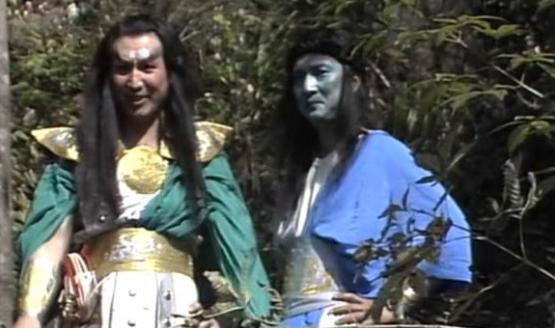Influenced by the book "The Evolution of the Gods", the gods enshrined in it seem to be recognized in the folk, and in the continuous interpretation of folk tales, the gods are like gods. In the story of the gods, even the characters who are not ranked as the three hundred and sixty-five road gods are also believed to be gods, such as Li Jing's wife Yin Shiniang as the "bedside mother-in-law", who is considered to be the god who protects children; and the two people who are highly intelligent and high-minded of the peach spirit willow monster, although it is stated in the book that after the death of the soul to go to the god platform, there are no two people in the list of the gods, but because of their identity of "peach essence and willow monster", they are said to be called "shendi and yulei" two door gods.

Film and television pictures ~ high intelligence
Looking at the names of the gods listed in the List of Gods, in fact, there is no god name of the title of "Door God", and the only ones that can be found related are "Manifest God Fang Bi" and "Open Road God Fang Xiang", perhaps these two god names are more in line with the priesthood of the Door God. This is not only inference, but in some areas it is true that "Fang Bi Fang Xiang" is regarded as a "general who holds the door". The reason why the two of them are regarded as door gods, in addition to the factors of the book "Fengshen Yanyi", is also related to the early witchcraft culture. Let's first talk about the plot of Fang Bi and Fang Xiang in the book...
Network courtesy of the image of Fang Bi Fang Xiang Men Deity
In the book, the two of themselves were the Zhendian generals of the Shang Dynasty, only because Dai Ji had planned to kill Empress Jiang, and wanted to hunt down and kill His Highnesses Yin Jiao and Yin Hong, Fang Bi fang xiang desperately escorted the two highnesses to escape. Later, the two highnesses were rescued by Guangchengzi and Chi Sperm in the Twelve Golden Immortals and taken to the mountain to be adopted as apprentices. In this way, because Fang Bi and Fang Xiang had left their posts and fled without authorization, they could no longer go back to Chaoge to continue their duties, so they had to refuse to guard a ferry port of the Yellow River and make a living of extortion. When it came to the "Wind Roar Array" in the Ten Absolute Arrays on Jiang Ziya's side, it was necessary to use the Dingfeng Beads of Du'er Zhenren, and as a result, on the way back from Shan Yisheng's borrowing of the beads, it was intercepted by Fang Bi and Fang Xiang, and then Huang Feihu surrendered the two and returned to Western Zhou. Before returning to the front, Fang Bi was sent to die, and his soul was returned to the Divine Platform (whether Fang Xiang died or not, whether he died in this review, the book does not state). When Jiang Ziya was canonized, the two were named as the "Tai Nian Subordinates" as the manifest god and the god of the way.
Fang Xiangshi looks like a person
In fact, regarding the name of "Fang Bi Fang Xiang", careful examination may be the author of the book. Why? Regarding "Fang Xiang", in the witch culture there is the title of "Fang Xiang Clan", according to the "Zhou Li Xia Guan Fang Xiang Clan" record, this so-called "Fang Xiang Clan" should be the name of the position, probably a wizard, the book contains "Fang Xiang Clan Palm: Bear Skin, Golden Four Eyes, Xuan Yi Zhu Pei, Zhi Ge Yang Dun, Shuai Bai Li and Shi Shu, to the Suo Room to drive away the epidemic", it is said that the Fang Xiang Clan also serves as the pioneer god in the exorcism ceremony. In the book, it is also explained that Fang Bi has "four eyes", which may be the origin of Fang Bi and the position of the canonized god in the "Fengshen Yanyi". In this way, Fang Bi Fang Xiang because the "Fang Xiang Clan" costume has the effect of expelling plague ghosts, coupled with the name of "manifesting the way, opening the way"; in addition, there is originally a "Town Hall General", the folk synthesize these to think that the two of them are "door gods", and worship and post, which is still maintained to this day.